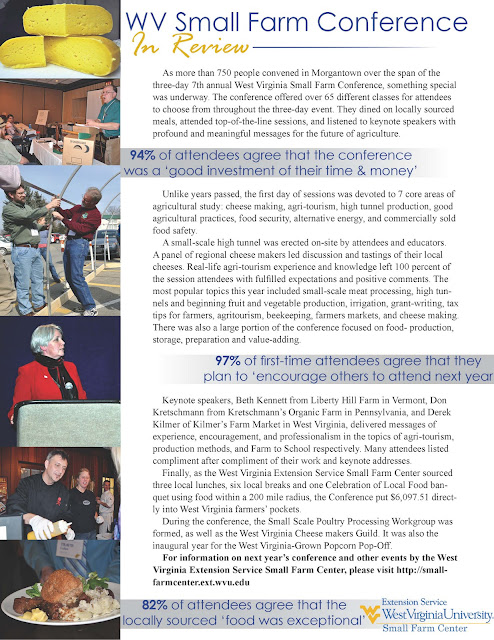It's that time of year, friends!...when farmers and community members from across the state will gather at Lakeview Resort and Conference Center in Morgantown for the 7th Annual WV Small Farm Conference, on February 17-19, 2011. Hosted by the WVU Extension Small Farm Center (that's us!), the conference covers a variety of topics such as agri-tourism, alternative energy, fruit and vegetable production, value adding, poultry production, cheese making, beekeeping, homesteading, food security, proper labeling and preparation of foods, and so much more. We'd love to see new faces, as well as, the annual attendees'. So bring your husbands, wives, friends, children, neighbors, and students (students have a 50% discount!)We invite potential attendees to visit our schedule of classes to see what might interest them or their family:
Visit the Small Farm Conference Schedule 2011
Class Information
The conference kicks-off on Thursday with seven day-long in-depth workshops. The list of topics was chosen from past attendees’ feedback and the topic’s overall relevance and importance to WV small farmers. A good example is the first topic of ‘Beginning Cheese making’. 1.) Cheese making for beginners and ‘want to be cheese makers’. This workshop will kick-off the cheese making educational program, which includes a field trip into cheese country to learn from those already producing. Other popular topics include: 2) Energy management and alternative energy for the farm and home (Be sure to check out the energy exhibit including a human powered generator). 3.) Agri-tourism and learning how to increase farm income by entertaining the public on your farm. 4.) Labeling products from the farm to the store shelf, as a sequel to the Better Process Control School including Food Safety Practices. 5.) The 2nd WV Food Security Summit. 6.) Good Agricultural Practices (GAP) for producers. and 7.) High Tunnel Management and Opportunities workshop.
The conference then moves into “high gear” on Friday and Saturday as experts, including farmers, Extension agents and specialists, professors, agency personnel, and industry representatives from across the US will be leading and teaching 60 different sessions throughout the two days. New on the program this year are many forest-based topics including ramp cultivation, shiitake mushrooms, ginseng, medicinal products, Christmas tree production and timber-stand management.
The 2011 WV Small Farm Conference is serving as host to the first ever West Virginia Small Scale Poultry Forum. Attendees can participate in classes on small scale poultry production including feeding, management, and marketing for layer operations and meat birds. In-depth classes and discussions of mobile processing operations, challenges, and possible opportunities will serve as areas of great interest to many WV small scale producers. In fact, after the mid-afternoon classes on Saturday the small scale producers and their advisors are invited to participate in a meeting to discuss the farmers’ available options to solve the problem of declining and disappearing commercial processing services available for WV farmers.
Fruit and vegetable production and management classes for beginners and experienced growers will be offered throughout the remaining two days of the conference. Those attending the low-cost high tunnel class will learn how to build a 20ft. by 40 ft. tunnel for less than $800.00. They will also be able to learn how to landscape with fruit bearing plants or develop a tree-fruit enterprise. The WV Farmers Market Association has developed a special series of classes for managers and vendors to help them further develop, lead and support their local markets. Other notable conference presentations include the details of the most successful and famous farm-to-cafeteria project in West Virginia, as the successful ‘Farm-to-School pioneers’ in Jefferson County share their experience and journey. Many attendees will appreciate the discussions of tax management and SARE and Specialty Crop Grants.
Better Process Control SchoolThe three-day event is preceded by the two-day Better Process Control School (Feb 15, 16), conducted by the West Virginia Dept. Agriculture. Registration for the School is separate from the conference. Interested in attending? Call 304-558-2210 for information and to register.
WVFMA's Winter Blues Farmers Market & Slow Food Regional Chapter's Dine-Around
Additionally, the Conference is kicked off on Thursday, February 17 by the 3rd Annual Winter Blues Farmers Market hosted and organized by the WV Farmers Market Association. Open to the public, the Market features farmers from all over the state and a huge variety of products, accompanied by live entertainment. The indoor market will run from 4-7 pm. EBT (SNAP Benefits), credit cards and bank cards will be accepted. Following the Farmers Market, for the first time ever, the Conference will host a number of area restaurants featuring their local food items during the Slow Food Revolution Dine-Around. Both events are open to the public.
Local Menu
As in the past, the Conference menu will be sourced entirely from local producers from across region and prepared by Lakeview Conference Center. As we are still securing menu items, please feel free to contact us with any product you may have. We love to diversify our producer list! Please note, we expect 300+ guests. Interested? Please contact Carrie See at 304-293-2715.
The conference is being hosted by the WVU Extension Service Small Farm Center in co-operation with the West Virginia Department of Agriculture. The Conference also will also receive assistance from faculty at West Virginia State University with a number of classes.
Questions?
For program details, registration forms or any additional information, please visit the WV Small Farm Center web site at http://smallfarmcenter.ext.wvu.edu/conference. Additional questions may be directed to Carrie See at 304-293-2715 or
carrie.see@mail.wvu.edu or by calling 304-293-2743.


